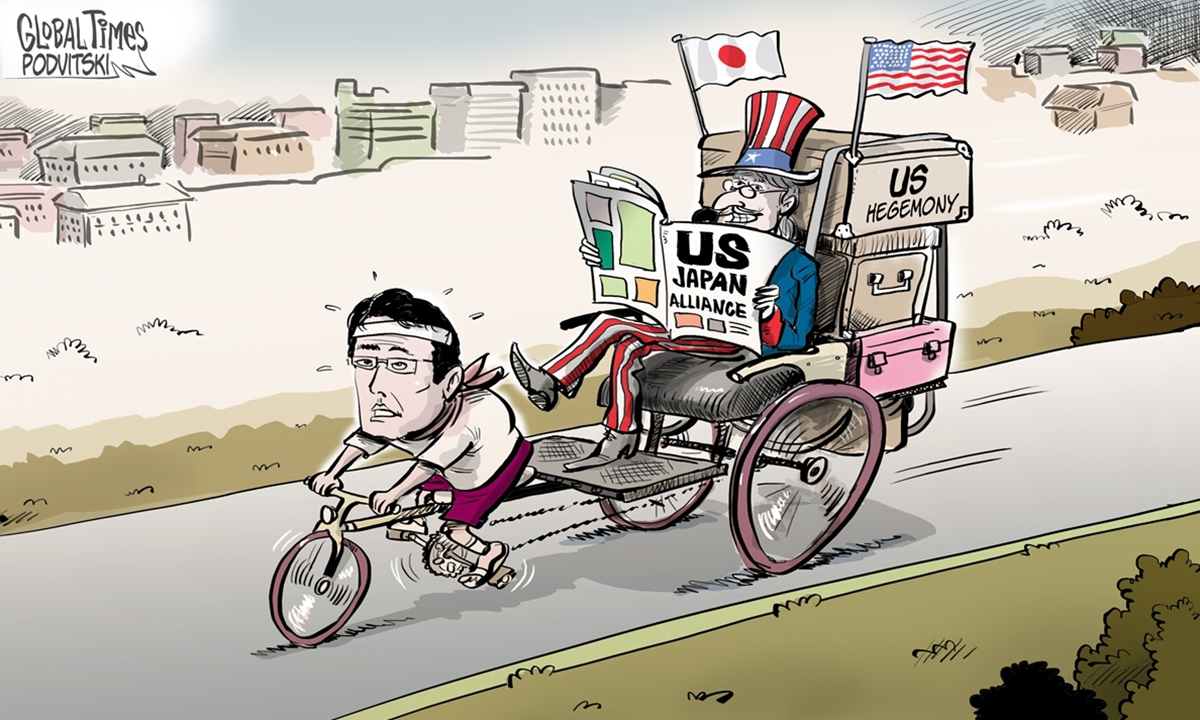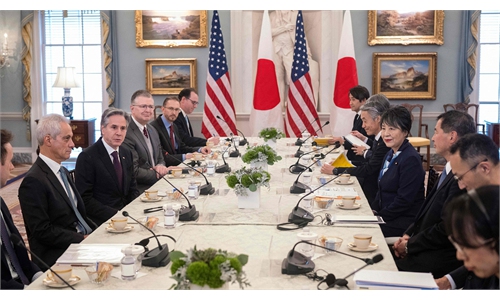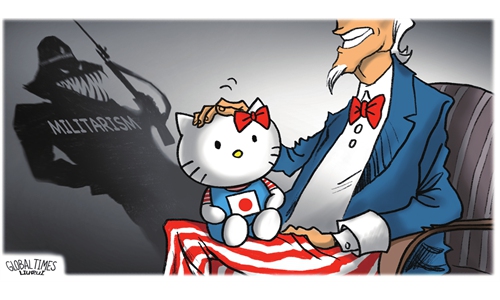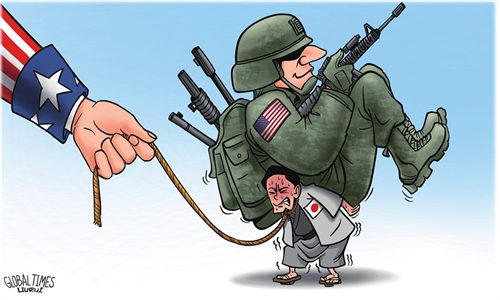The upgrading and transformation of the US-Japan alliance unleashes a dangerous force: Global Times editorial

Well-trained pawn Illustration: Vitaly Podvitski
The British Financial Times reported recently that Japanese Prime Minister Fumio Kishida and US President Joe Biden will reach an agreement to significantly update the Treaty of Mutual Cooperation and Security between the US and Japan during Kishida's visit to Washington in April. They will announce plans to restructure the US military command in Japan to strengthen operational planning and exercises between the nations. This will be the biggest upgrade to their security alliance since they signed a mutual defense treaty in 1960.The article believes that the spearhead of the US-Japan security upgrade is aimed at China, stating that this move is aimed at responding to "a growing threat from China." The two countries' militaries will strengthen cooperation "more seamlessly" to deal with crisis such as a Taiwan Straits conflict. Although Japanese Chief Cabinet Secretary Yoshimasa Hayashi did not directly respond to this during a routine press conference on March 25, he stated that Japan and the US are discussing strengthening cooperation guidelines for command and control to enhance interoperability and response readiness.
In recent years, there have been frequent trends toward the strengthening of military integration between the US forces stationed in Japan and the Japanese Self-Defense Forces, but the information revealed by this "upgrade" is unusual. This is because compared to ordinary military deployments and joint exercises, the integration of the US-Japan joint operational command system clearly targets a third party, signaling a preparation for war with the intention of jointly intervening in geopolitical hotspots. The spillover effects on regional security brought about by this "upgrade" are worthy of vigilance. After the "upgrade" of the US-Japan alliance, in terms of its nature, it will far exceed its original purpose of "defending" Japan and will transform from a defensive alliance into one with offensive capabilities, indicating a qualitative change in the nature of the US-Japan alliance.
Regarding this change, the common perception is that the US is pushing Japan into the "anti-China chariot" to advance its Indo-Pacific strategy. While this view is not entirely incorrect, it overlooks Japan's initiative. In fact, with Japan's military ambitions continually expanding, the "superior-subordinate" alliance between the US and Japan has been quietly changing in recent years. With the tacit support of the US, Japan is systematically breaking free from the constraints of the Pacifist Constitution, attempting to become a military power once again. Especially after the Kishida cabinet introduced three security documents in late 2022, Japan started its largest-ever military expansion process since World War II. The two main directions are: developing offensive military capabilities and doubling defense spending. These actions are undermining Japan's post-war policy of "exclusive self-defense," further hollowing out the Pacifist Constitution.
From a different perspective, within the framework of the US-Japan alliance, Japan, which is now taking a more proactive stance, is even pushing the US forward. Due to the lack of independent operational command by the US forces stationed in Japan, they must follow the directives of US Indo-Pacific Command based in Hawaii. The Japanese side believes that this affects the efficiency of rapid response and coordinated operations between the two sides, and has been pushing for the US to grant higher operational command authority to the US forces stationed in Japan. The Japanese military is also planning to establish a "Joint Operations Command" next year in order to enhance coordination between various branches and departments, thereby integrating with the US forces stationed in Japan to create a unified operational command system.
Japan is seeking to enhance its "autonomy" in the US-Japan alliance, striving for equal status with the US. This cannot be simply explained as Japan's "post-war national goals" or "great power ambitions" based on the current situation in Japan. Instead, there is great danger involved. The rightward conservative trend in Japanese politics has been continuously breaking through the post-war taboo. Strengthening the military, which was previously only advocated by right-wing forces, has now become a major policy of the Japanese government. Furthermore, Japan is enthusiastic about participating in geopolitical competition in its foreign policy, collaborating with distant allies and targeting nearby deemed enemies. Senor Japanese officials even openly proclaimed that "a Taiwan emergency is a Japanese emergency," and advocated that "Taiwan is a part of Japan's lifeline," inevitably reminiscent of Japan's "lifeline in Manchuria" theory during the Japanese War of Aggression against China.
Actually, the US has long been concerned about the huge destructive impact caused by Japan in World War II. The presence of US troops in Japan is a product of the Cold War, but it also has an unspoken purpose. From former US secretary of state Henry Kissinger to many US military leaders, it has been mentioned that the presence of US troops in Japan serves as a "cap-in-the-bottle" to prevent the revival of Japanese militarism and the arming of Japan with nuclear weapons. Now, driven by the need for strategic competition with China, the US seems to have forgotten history and intends to unleash Japan's military capabilities, trying to push Japan back into war by constantly exaggerating the "2027 Taiwan Straits conflict." Some may think that today's Japan is not the same as it was back then. History doesn't simply repeat itself, but it is always surprisingly similar. Without a doubt, if the dangerous force within Japan is "unleashed," it will threaten the peace and stability of the Asia-Pacific region, but ultimately the biggest harm will still be to Japan itself.



